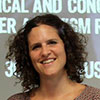LAB 19: Who is controlling the internet? Toward a transnational model of democratic accountability
19 November 2015 - 16.00-17.30 - Room 5, Palais de l'Europe, Interpretation: FR/EN
Focusing on multi-stakeholder and inclusive models of democratic decision-making, this Lab will discuss frameworks of application for inclusive, transparent and accountable Internet governance.
ICANN’s approach of multi-stakeholder governance
The Internet has attributes of a general purpose technology affecting directly or indirectly the daily lives of every person on the planet, every economy, culture and society. This new global commons should be shared and protected, and the means of governance of the Internet should serve the global community as a whole, rather than the particular interests of a small number of actors such as corporations or states, or driven by decisions made in policy making venues that are open only to a few. Internet governance should adhere to the principles of democratic governance. These governance principles have been illustrated in practice by the emergence of pioneering, so-called ‘multi-stakeholder’ models of governance. However, some crucial questions remain unanswered: What will be the source of legitimacy and the processes which ensure transparency and accountability of Internet governance? How can we make sure that the rights of Internet users will be protected in this new environment? How can Internet governance venues that address crucial Internet policy issues be held accountable, and do we need criteria that specifically address and establish standards of accountability and transparency in Internet governance?
Presenter(s)

Jean-Jacques Sahel is a strong advocate for the open Internet and multi-stakeholder model of Internet governance, in Europe and beyond. For over 15 years in both the private and government sectors, Jean-Jacques has been involved in international government and regulatory affairs. He leads ICANN’s strategic plan for outreach, support and engagement with governments, private sector, civil society and user groups throughout the region. Working closely with the Internet community across Europe, he is focused on enhancing awareness, capacity and participation of all stakeholders in ICANN. Before joining ICANN in 2014, Jean-Jacques headed government and regulatory affairs for Skype, then digital policy at Microsoft for Europe, Middle-East & Africa regions.
Discussants are invited to take part in the Labs in order to share their experience with the presented democratic initiatives and try to bring broader perspectives to the following discussions.

Lea Kaspar heads Global Partners Digital's (GPD) programmatic portfolio and leads the organisation's international policy arm. Since joining GPD in 2012, she has been managing a range of projects at the intersection of human rights and digital communications, acquiring an in-depth understanding of the changing dynamics in the field. During this period, she has concentrated upon facilitating effective civil society engagement in a range of international forums and processes, the outcomes of which bear relevance for human rights and individual freedoms. She has developed and coordinated a number of information sharing, capacity building, and advocacy initiatives, including at the Internet Governance Forum (IGF), the Global Conference on Cyberspace (GCCS), NETmundial, the WSIS+10 Review process, the UN CSTD Working Group on Enhanced Cooperation (WGEC), and various processes of the International Telecommunication Union (ITU).

Stefania Milan is a researcher, writer and activist whose work explores the intersection of digital technology, governance and activism. She is Assistant Professor at the University of Amsterdam, where she leads a research team exploring the politics of big data. She is the author of ‘Social Movements and Their Technologies: Wiring Social Change’ (Palgrave Macmillan, 2013) and co-author of ‘Media/Society’ (Sage, 2011). She sits in the Council of the Generic Names Supporting Organization of the International Corporation for Assigned Names and Numbers, and in the Executive Committee of the NonCommercial User Constituency. She contributes to the Working Group ‘An Internet Free and Secure’ of the Freedom Online Coalition.

Julien Nocetti is a Research Fellow at the Paris-based think tank French Institute of International Relations (IFRI). He currently focuses his research on the intersection between global internet governance and international relations. His research interests also include Russia's foreign and domestic internet policies, as well as the European Union's cyber diplomacy. He recently published “Contest and conquest: Russia and global internet governance” (International Affairs, 91:1, 2015), and “Emerging powers and internet governance: is a ‘third way’ possible?” (Politique étrangère, 79:4, winter 2014-2015). He regularly participates in international fora and publishes opinion columns in international media on these above-mentioned issues.

Lee Hibbard is coordinating the Council of Europe’s Internet policy in various international forums (EuroDIG, IGF, ICANN). At the content level, he is currently facilitating the Council of Europe’s upcoming Internet Governance Strategy 2016-2019. He has also the co-author of a new report on Children and young people’s sustainable digital development: Education 3.0 and Internet Governance as a new global alliance for dynamic learning, greater employability and general well-being.
Mr Matthieu CHIARA
- Diminuer la taille du texte
- Augmenter la taille du texte
- Imprimer la page
Challenge 1
Ensuring security and bringing surveillance under control
Challenge 2
Liberating society from fear and nurturing the desire for freedom
Challenge 3
Freedom of information in the “age of terror”
- LAB15
Safe whistleblowing - LAB16
Protection of journalists and freedom of information - LAB17
Framing freedom of expression? Between media regulation and the protection of personal data - LAB18
Civic Action for Media Freedom - LAB19
Who is controlling the internet? Toward a transnational model of democratic accountability
